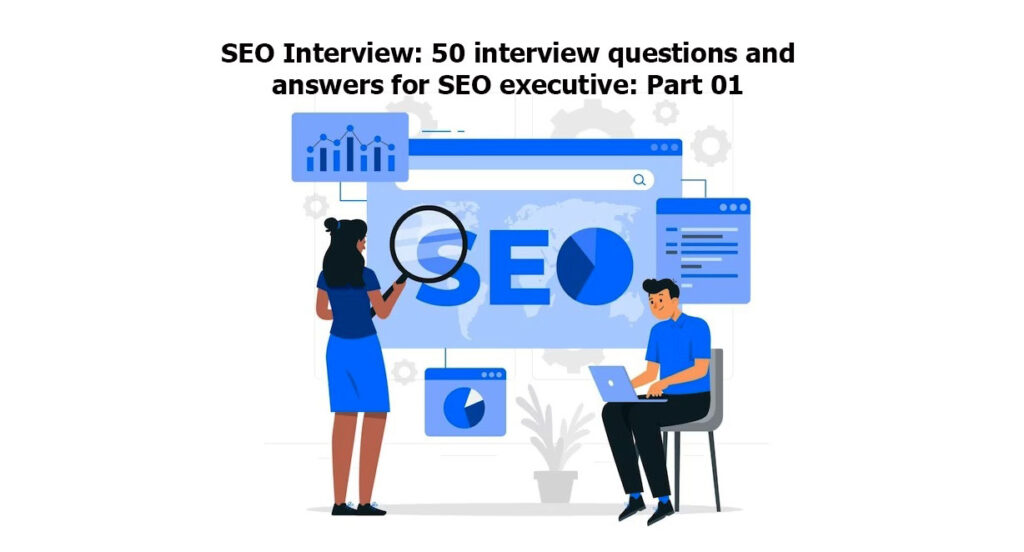
SEO Interview: 50 interview questions and answers for SEO executive: Part 01
-
What inspired you to pursue a career in SEO?
Answer: I have always been interested in digital marketing, and SEO is an essential aspect of it. The idea of optimizing websites to improve their search engine rankings, and driving traffic to websites is fascinating to me.
-
What is the most important skill required for an SEO executive?
Answer: The most important skill required for an SEO executive is attention to detail. SEO requires a keen eye for detail and an ability to analyze data and draw insights from it.
-
What is your experience with SEO tools like Google Analytics, SEMrush, and Ahrefs?
Answer: I have extensive experience with SEO tools like Google Analytics, SEMrush, and Ahrefs. These tools are essential for measuring website traffic, analyzing competitor strategies, and optimizing website performance.
-
How do you approach keyword research?
Answer: I approach keyword research by identifying relevant topics that are related to the website’s niche. I then use keyword research tools to identify the most relevant and high-traffic keywords for each topic.
-
What are some of the most effective on-page optimization techniques?
Answer: Some of the most effective on-page optimization techniques include optimizing meta tags, using header tags, improving website load speed, optimizing images, and creating high-quality content.
-
How do you measure the success of an SEO campaign?
Answer: The success of an SEO campaign can be measured by analyzing website traffic, keyword rankings, conversion rates, and engagement metrics like bounce rate and time spent on site.
-
What is your experience with link building?
Answer: I have extensive experience with link building, including creating link building strategies, outreach to relevant websites, and analyzing the quality of backlinks.
-
What are some common SEO mistakes that you have seen businesses make?
Answer: Some common SEO mistakes include keyword stuffing, using low-quality backlinks, ignoring on-page optimization, and not optimizing for mobile.
-
What is your approach to website audits?
Answer: My approach to website audits involves analyzing website performance, identifying technical issues, reviewing on-page optimization, analyzing backlink profiles, and creating an action plan to improve website performance.
-
What do you consider to be the most important element of an SEO strategy?
Answer: The most important element of an SEO strategy is creating high-quality, relevant content that is optimized for search engines and provides value to users.
-
How do you stay up-to-date with the latest SEO trends and best practices?
Answer: I stay up-to-date with the latest SEO trends and best practices by attending industry events, reading industry publications, and regularly engaging with SEO communities online.
-
How do you prioritize SEO tasks?
Answer: I prioritize SEO tasks based on their level of impact on website performance and the urgency of the task.
-
How do you approach optimizing a website for local search?
Answer: I approach optimizing a website for local search by ensuring that the website is listed on relevant directories and review sites, optimizing local keywords, and creating local content.
-
How do you analyze competitor strategies?
Answer: I analyze competitor strategies by analyzing their website structure, backlink profiles, content strategies, and social media presence.
-
How do you approach optimizing content for featured snippets?
Answer: I approach optimizing content for featured snippets by creating high-quality, informative content, using clear and concise language, and answering common questions related to the topic.
-
How do you measure the ROI of an SEO campaign?
Answer: The ROI of an SEO campaign can be measured by analyzing the increase in website traffic, leads, and sales generated by the campaign, compared to the investment made in SEO efforts.
-
What is your experience with Google Analytics?
Answer: I have extensive experience with Google Analytics, including setting up and configuring accounts, analyzing website traffic data, and creatingcustom reports to track key performance indicators.
-
How do you approach optimizing website structure for SEO?
Answer: I approach optimizing website structure for SEO by ensuring that the website has a clear and logical hierarchy, creating descriptive and user-friendly URLs, and using internal linking to guide users and search engines through the site.
-
How do you approach optimizing website speed for SEO?
Answer: I approach optimizing website speed for SEO by optimizing images and other media, reducing the number of HTTP requests, minimizing code and script sizes, and leveraging browser caching.
-
What is your experience with technical SEO?
Answer: I have extensive experience with technical SEO, including optimizing website code, analyzing website performance metrics, and identifying and fixing technical issues.
-
What are some effective strategies for optimizing content for voice search?
Answer: Some effective strategies for optimizing content for voice search include using conversational language, providing direct and concise answers to questions, and focusing on long-tail keywords.
-
How do you approach optimizing website content for mobile?
Answer: I approach optimizing website content for mobile by ensuring that the website is mobile-responsive, optimizing images and media for mobile devices, and creating clear and concise content that is easy to read on small screens.
-
How do you approach optimizing website content for international SEO?
Answer: I approach optimizing website content for international SEO by ensuring that the website is optimized for the target language and culture, using hreflang tags to indicate language and regional variations, and creating location-specific content.
-
How do you approach optimizing website content for visual search?
Answer: I approach optimizing website content for visual search by optimizing image metadata, using alt tags and captions, and creating descriptive and informative image titles.
-
What is your experience with social media and its impact on SEO?
Answer: I have extensive experience with social media and its impact on SEO, including optimizing social media profiles for SEO, promoting content on social media to drive traffic and engagement, and analyzing social media metrics to inform SEO strategies.
You may also like: